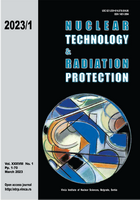
ASSESSING RADIATION HAZARDS ASSOCIATED WITH NATURAL RADIOACTIVITY IN BUILDING MATERIALS IN HO CHI MINH CITY, VIETNAM
Pages: 30-38
Authors: Le Quang Vuong, Huynh Dinh Chuong, Lam Duy Nhat, Hoang Duc Tam, Tran Thien Thanh, Vu Tuan Minh, Le Dunh Hung, Phan Long Ho, and Chau Van TaoAbstract
This study is aimed at assessing radiation hazards associated with natural radioactivity in common building materials used in Ho Chi Minh City, Vietnam. Thirty-six samples from eighteen types of building materials were collected to measure activity concentrations using the gross alpha/beta counting system and gamma-ray spectrometry. The gross alpha and gross beta activity concentrations ranged from 94.7 ± 31.3 to 1045.1 ± 112.3 Bqkg-1 and 104.9 ± 4.7 to 834.4 ± 37.1 Bqkg-1, respectively. In addition, the activity concentrations of 226Ra, 232Th, and 40K were also determined, which ranged from 4.1 ± 0.1 to 53.5 ± 0.4 Bqkg-1, 5.7 ± 0.1 to 83.6 ± 0.8 Bqkg-1, and 14.9 ± 0.8 to 664.9 ± 10.6 Bqkg-1, respectively. The indices including radium equivalent activity, external and internal radiation hazard, gamma and alpha indices, activity utilization index, and annual effective dose, were calculated to evaluate the radiological hazards of natural radioactivity. The results showed that these indices were below the recommended safety limits for most investigated samples except six brick samples, whose activity utilization indexes are slightly higher than the safety limit. Even so, all annual effective doses of the samples were found to be below the world average.
Key words:building material, gross alpha/beta, gamma spectrometry, natural radioactivity,
radiological hazard
FULL PAPER IN PDF FORMAT (835 KB)
